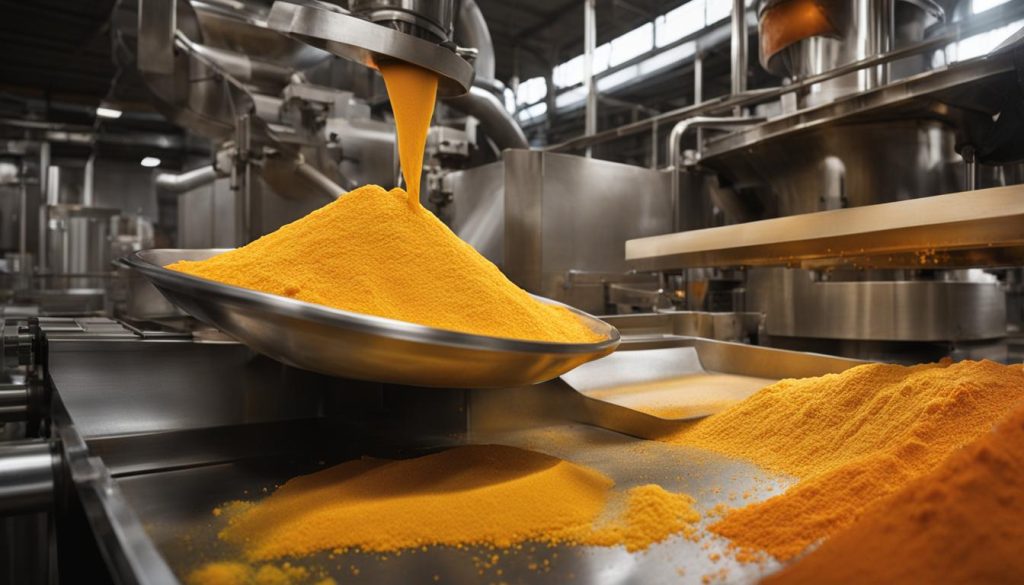When it comes to managing arthritis symptoms, making dietary choices plays a crucial role. Certain foods can increase inflammation and worsen joint pain. Here are the 10 worst foods for arthritis that you should avoid to reduce joint pain and inflammation.
Worst Foods for Arthritis
- Avoiding certain foods can help reduce inflammation and joint pain in arthritis.
- Sugar-sweetened sodas and desserts should be avoided as they can worsen arthritis symptoms.
- Processed and red meats may lead to inflammation and worsen arthritis symptoms.
- Gluten-containing foods, such as wheat, barley, and rye, can increase inflammation and worsen symptoms in some individuals.
- Highly processed foods, including fast food and baked goods, can be inflammatory and should be limited.
Added Sugars
When it comes to managing arthritis symptoms, it’s important to pay attention to your diet. One factor that can worsen arthritis symptoms and increase inflammation is the consumption of added sugars. These sugars can be found in various foods and beverages, including candy, soda, ice cream, and desserts.
A study conducted among individuals with rheumatoid arthritis (RA) found that sugar-sweetened sodas and desserts were most likely to worsen their symptoms. It’s worth noting that added sugars are not only present in obvious sources like sugary treats but also hide in unexpected places like barbecue sauce, salad dressings, and ketchup.
Reducing your intake of added sugars can help alleviate arthritis symptoms and promote overall joint health. Instead, opt for natural sugars found in whole fruits and limit your consumption of processed foods high in sugar content.
Processed and Red Meats
When it comes to managing arthritis symptoms, dietary choices play a significant role. Research suggests that consuming processed meats and red meat can lead to inflammation and worsen arthritis symptoms. These meats contain substances like interleukin-6 (IL-6), C-reactive protein (CRP), and homocysteine, which are markers of inflammation. Plant-based diets that exclude red meat may help improve arthritis symptoms. In fact, studies have shown that individuals who follow plant-based diets experience a reduction in inflammation and joint pain.
Processed meats, such as hot dogs, sausages, and deli meats, have been linked to higher levels of inflammation in the body. These meats usually undergo various processes, such as curing, smoking, or adding preservatives, which can increase their inflammatory properties. Additionally, studies have found a link between processed meat consumption and a higher risk of rheumatoid arthritis (RA).
Red meat, including beef, pork, and lamb, contains higher levels of saturated fats and arachidonic acid, both of which can promote inflammation in the body. Arachidonic acid is a type of omega-6 fatty acid that is involved in the production of inflammatory substances in the body.
To reduce inflammation and alleviate arthritis symptoms, it is recommended to limit or avoid the consumption of processed meats and red meat. Instead, opt for lean protein sources such as poultry, fish, tofu, and legumes. These alternatives provide essential nutrients without the inflammatory properties associated with processed and red meats.
The Role of Plant-Based Diets
Plant-based diets can offer numerous benefits for individuals with arthritis. By emphasizing whole, unprocessed foods like fruits, vegetables, whole grains, nuts, and seeds, plant-based diets provide a rich array of vitamins, minerals, and antioxidants that contribute to reducing inflammation in the body. Moreover, these diets are typically lower in saturated fats and higher in fiber, which can support overall joint health.
Incorporating more plant-based meals into your diet may not only alleviate arthritis symptoms but also promote a general sense of well-being. If you decide to transition to a plant-based diet, consult with a registered dietitian or nutritionist to ensure you are getting all the necessary nutrients.
Gluten-Containing Foods
Gluten, a group of proteins found in wheat, barley, rye, and other cereals, has been linked to increased inflammation and may worsen arthritis symptoms. Some research suggests that a gluten-free diet can help ease arthritis symptoms, particularly in people with celiac disease, who have a higher risk of RA. However, more research is needed to confirm whether a gluten-free diet benefits all people with arthritis.
- Evidence links gluten to increased inflammation and worsened arthritis symptoms.
- A gluten-free diet may provide relief for individuals with celiac disease and arthritis.
- Further research is necessary to determine the effectiveness of a gluten-free diet for all arthritis patients.
Highly Processed Foods
When it comes to managing arthritis symptoms, it’s important to pay attention to the type of foods we consume. Among the various culprits that can worsen joint pain and inflammation, highly processed foods are a major concern. These foods, including fast food, breakfast cereal, and baked goods, are often loaded with refined grains, added sugar, preservatives, and other potentially inflammatory ingredients.
Refined grains, commonly found in highly processed foods, have gone through extensive processing, stripping them of their natural fiber and nutrients. This not only contributes to the rapid rise in blood sugar levels but also promotes inflammation in the body.
Added sugar is another problematic component found in many highly processed foods. Excessive consumption of added sugar has been linked to various health issues, including inflammation and chronic diseases like arthritis. It’s important to note that added sugar can hide under different names, such as corn syrup, dextrose, fructose, and sucrose, so it’s crucial to carefully read food labels to make informed choices.
To minimize the negative impact of highly processed foods on arthritis symptoms, it is recommended to reduce their consumption and opt for healthier alternatives. Including whole, unprocessed foods like fruits, vegetables, lean proteins, whole grains, and healthy fats can help improve overall health and reduce inflammation in the body.
To visualize the harmful effects of highly processed foods, take a look at this image:

- Highly processed foods are often high in refined grains, added sugar, preservatives, and inflammatory ingredients.
- Refined grains can lead to rapid blood sugar spikes and promote inflammation.
- Added sugar is associated with inflammation and can hide under various names on food labels.
- Choosing whole, unprocessed foods over highly processed alternatives can help reduce inflammation and improve overall health.
Certain Vegetable Oils
Diets high in omega-6 fats and low in omega-3 fats can worsen symptoms of knee pain, which is common in osteoarthritis (OA) and rheumatoid arthritis (RA). To reduce inflammation and promote joint health, it is important to maintain a balance between these types of oils.
The Role of Omega-6 and Omega-3 Fats
Omega-6 fats are essential polyunsaturated fats that our bodies need, but excessive intake can contribute to inflammation. Common sources of omega-6 fats include margarines, vegetable shortening, and cooking oils such as corn and safflower.
On the other hand, omega-3 fats have anti-inflammatory properties and can help alleviate knee pain. They can be found in oily fish like salmon and mackerel, as well as in oily seeds such as flaxseeds and chia seeds.
Tips for Achieving a Healthy Balance
To optimize the omega-6 to omega-3 ratio in your diet and support joint health, consider the following tips:
- Choose oils low in omega-6 fats, such as olive oil, avocado oil, or canola oil.
- Incorporate more fatty fish into your diet, aiming for at least two servings per week.
- Include omega-3-rich foods like flaxseeds, chia seeds, and walnuts in your meals.
By making these adjustments to your diet, you can help reduce inflammation, support joint function, and potentially alleviate knee pain associated with arthritis.
Foods High in Salt
Consuming foods high in salt can be detrimental for people with arthritis. High sodium intake has been associated with increased inflammation and an increased risk of autoimmune diseases, including inflammatory arthritis.
Some common high salt foods to avoid include:
- Shrimp
- Canned soup
- Pizza
- Processed meats
These processed foods often contain high levels of sodium, which can contribute to inflammation and worsen arthritis symptoms.
It is important to limit salt intake and choose low-sodium alternatives. Using herbs, spices, and seasoning mixes without added salt can help flavor your food without relying on salt. Additionally, opting for fresh fruits, vegetables, and whole grains can help reduce sodium intake and promote a healthier diet.

Foods High in AGEs
Foods high in dietary advanced glycation end products (AGEs) can have adverse effects on your body, particularly for those with inflammatory arthritis like rheumatoid arthritis (RA). AGEs are molecules that form when sugars react with proteins or fats and can increase oxidative stress and inflammation in the body, leading to worsened arthritis symptoms.
Research has shown that people with RA often have higher levels of AGEs in their bodies. The accumulation of AGEs in bones and joints can contribute to the development and progression of osteoarthritis (OA), a common form of arthritis. Therefore, it is essential to be mindful of your intake of foods high in AGEs.
To reduce the total AGE load in your body and alleviate arthritis symptoms, consider replacing high AGE foods with nutritious whole foods. Opt for a diet rich in vegetables, fruits, legumes, and fish, which are not only lower in AGEs but also provide essential nutrients for bone and joint health. By making these dietary choices, you can help decrease oxidative stress, inflammation, and the risk of arthritis progression.
FAQ
What are the worst foods for arthritis that I should avoid?
Some of the worst foods for arthritis are added sugars, processed and red meats, gluten-containing foods, highly processed foods, certain vegetable oils, foods high in salt, and foods high in AGEs. These foods can increase inflammation and worsen joint pain in people with arthritis.
How do added sugars affect arthritis symptoms?
Added sugars can worsen arthritis symptoms and increase inflammation. They can be found in candy, soda, ice cream, and various other foods, including barbecue sauce, salad dressings, and ketchup. Consuming sugar-sweetened sodas and desserts has been found to specifically worsen symptoms in people with rheumatoid arthritis (RA).
Why should I avoid processed and red meats if I have arthritis?
Processed and red meats contain substances like interleukin-6 (IL-6), C-reactive protein (CRP), and homocysteine, which are markers of inflammation. Research suggests that consuming these meats can lead to inflammation and worsen arthritis symptoms. Opting for plant-based diets that exclude red meat may help improve arthritis symptoms.
Is gluten bad for arthritis?
Gluten, found in wheat, barley, rye, and other cereals, has been linked to increased inflammation and may worsen arthritis symptoms. Some research suggests that a gluten-free diet can help ease symptoms, particularly in people with celiac disease who have a higher risk of rheumatoid arthritis (RA). However, more research is needed to confirm whether a gluten-free diet benefits all people with arthritis.
Why are highly processed foods harmful for arthritis?
Highly processed foods, such as fast food, breakfast cereal, and baked goods, are often high in refined grains, added sugar, preservatives, and other potentially inflammatory ingredients. These foods have been associated with an increased risk of rheumatoid arthritis (RA) and may worsen arthritis symptoms. Opting for healthier, whole food alternatives can improve overall health and reduce the risk of other diseases.
How do certain vegetable oils affect arthritis symptoms?
Diets high in omega-6 fats and low in omega-3 fats can worsen symptoms of knee pain, which is common in osteoarthritis (OA) and rheumatoid arthritis (RA). Maintaining a balance between these types of oils is important to reduce inflammation. Opting for oils low in omega-6 fats, like olive oil, and increasing intake of omega-3 rich foods, such as fatty fish, can help optimize the omega-6 to omega-3 ratio and alleviate arthritis symptoms.
Can foods high in salt worsen arthritis symptoms?
Yes, consuming foods high in salt can be detrimental for people with arthritis. High sodium intake has been associated with increased inflammation and an increased risk of autoimmune diseases, including inflammatory arthritis. It is important to limit salt intake and choose low-sodium alternatives. Using herbs, spices, and seasoning mixes without added salt can help flavor your food without relying on salt.
What are foods high in AGEs and how do they affect arthritis?
Foods high in advanced glycation end products (AGEs) are molecules formed through reactions between sugars and proteins or fats. These foods can increase oxidative stress and inflammation in the body. People with inflammatory arthritis, such as rheumatoid arthritis (RA), may have higher levels of AGEs in their bodies. High accumulation of AGEs in bones and joints can contribute to the development and progression of osteoarthritis (OA). Replacing high AGE foods with nutritious whole foods, such as vegetables, fruits, legumes, and fish, can help reduce the total AGE load in your body and alleviate arthritis symptoms.




